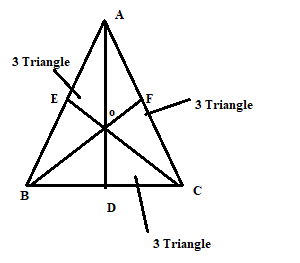Non Verbal Reasoning Practice Question and Answer
8 Q: Find the number of triangles in the figure.
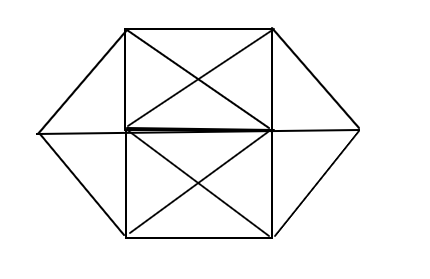
2856 05d2c150d2bb9b81db4a97cc6
5d2c150d2bb9b81db4a97cc6
- 120false
- 224false
- 328true
- 432false
- Show Answer
- Workspace
- SingleChoice
Answer : 3. "28"
Explanation :
The below figure shown the total no. of triangles is 8+8+2+6+4=28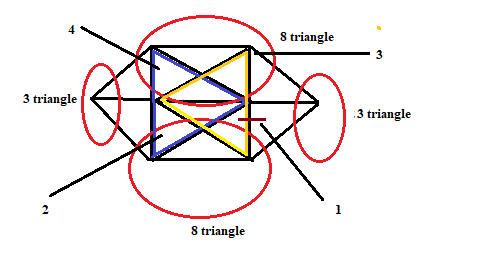
Q: Find the number of rectangles?
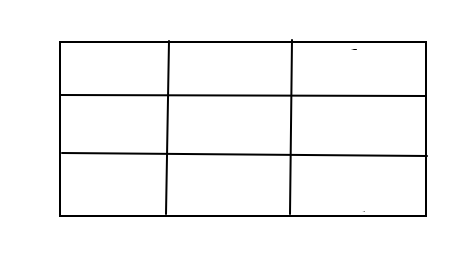
60911 45d2c02a040a93b3eb992db40
5d2c02a040a93b3eb992db40
- 119false
- 228false
- 327false
- 436true
- Show Answer
- Workspace
- SingleChoice
Answer : 4. "36"
Explanation :
First mark each rectangles 1, 2 and 3 after we can cube of 1 +8+27=36 we get the answer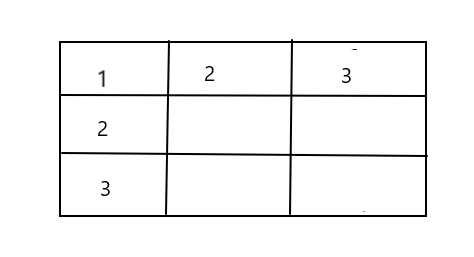
Q: Determine the number of rectangles and hexagons in the following figure. 4337 35b5cc7b0e4d2b41977750821
5b5cc7b0e4d2b41977750821- 130, 5true
- 232, 3false
- 328, 5false
- 430, 3false
- Show Answer
- Workspace
- SingleChoice
Answer : 1. "30, 5"
Explanation :
Answer: A) 30, 5 Explanation: The figure may be labelled as shown Rectangles : The simplest rectangles are CVSR, VETS, RSWM and STKW i.e 4 in number. The rectangles composed of two components each are CETR, VEKW, RTKM and CVWM i.e 4 in number. The rectangles composed of three components each are ACRP, PRMO, EGHT and THIK i.e 4 in number. The rectangles composed of four components each are CEKM, AVSP, PSWO,VGHS and SHIW i.e 5 in number. The rectangles composed of five components each are AETP, PTKO, CGHR and RHIM i.e 4 in number. The rectangles composed of six components each are ACMO and EGIK i.e 2 in number. The rectangles composed of eight components each are AGHP, PHIO, AVWO and VGIW i.e 4 in number. The rectangles composed of ten components each are AEKO and CGIM i.e 2 in number. AGIO is the only rectangle having sixteen components Total number of rectangles in the given figure = 4 + 4 + 4 + 5 + 4 + 2 + 4 + 2 + 1 = 30. Hexagons : The hexagons in the given figure are CDEKLM, CEUKMQ, CFHJMQ, BEUKNP and BFHJNP. So, there are 5 hexagons in the given figure.
Q: From the given alternatives select the word which be formed using the letters of the given word.
OPERATION
3004 05d25b7589d63ad4996c0a0f5
5d25b7589d63ad4996c0a0f5- 1CAPTIONfalse
- 2ROTATIONfalse
- 3OPTIONtrue
- 4NATIONfalse
- Show Answer
- Workspace
- SingleChoice
Answer : 3. "OPTION"
Q: Find the number of triangles?
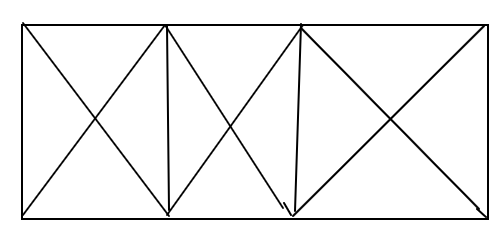
5753 05d2c05cd40a93b3eb992db46
5d2c05cd40a93b3eb992db46
- 129false
- 225false
- 328true
- 424false
- Show Answer
- Workspace
- SingleChoice
Answer : 3. "28"
Explanation :
in the above figure it consist 8 triangle so that no. of square is 3 so that total no. of triangle is 8 ✖ 3=24
and 4 triangle shown in question figure so that answer is 24+4=28 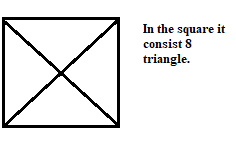
Q: When two dice are thrown simultaneously, what is the probability that the sum of the two numbers that turn up is less than 12? 2092 05b5cc5ffe4d2b4197774b427
5b5cc5ffe4d2b4197774b427- 135/36true
- 217/36false
- 315/36false
- 41/36false
- Show Answer
- Workspace
- SingleChoice
Answer : 1. "35/36"
Explanation :
Answer: A) 35/36 Explanation: When two dice are thrown simultaneously, the probability is n(S) = 6x6 = 36 Required, the sum of the two numbers that turn up is less than 12 That can be done as n(E) = { (1,1), (1,2), (1,3), (1,4), (1,5), (1,6)(2,1), (2,2), (2,3), (2,4), (2,5), (2,6)(3,1), (3,2), (3,3), (3,4), (3,5), (3,6)(4,1), (4,2), (4,3), (4,4), (4,5), (4,6)(5,1), (5,2), (5,3), (5,4), (5,5), (5,6)(6,1), (6,2), (6,3), (6,4), (6,5) } = 35 Hence, required probability = n(E)/n(S) = 35/36.
Q: Two dice are rolled simultaneously. Find the probability of getting a total of 9. 2460 05b5cc7d1e4d2b41977751268
5b5cc7d1e4d2b41977751268- 11/3false
- 21/9true
- 38/9false
- 49/10false
- Show Answer
- Workspace
- SingleChoice
Answer : 2. "1/9"
Explanation :
Answer: B) 1/9 Explanation: S = { (1, 1), (1, 2), (1, 3), (1, 4),(1, 5), (1, 6), (2, 1), (2, 2),.........(6, 5), (6, 6) } => n(S) = 6 x 6 = 36 E = {(6, 3), (5, 4), (4, 5), (3, 6) } => n(E) = 4 Therefore, P(E) = 4/36 = 1/9
Q: Find the number of triangles ?
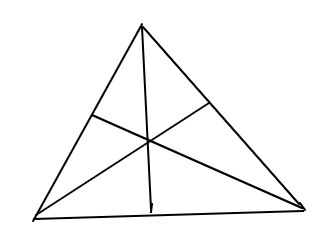
5477 05d2c0a4640a93b3eb992dba5
5d2c0a4640a93b3eb992dba5
- 116true
- 213false
- 39false
- 47false
- Show Answer
- Workspace
- SingleChoice
Answer : 1. "16"
Explanation :
3+3+3=9 triangle
Triangle ABD +Triangle ADC =2
Same as 2+2+2=6
And Triangle ABC=1
So that total no of triangle in this figure is 9+6+1=16